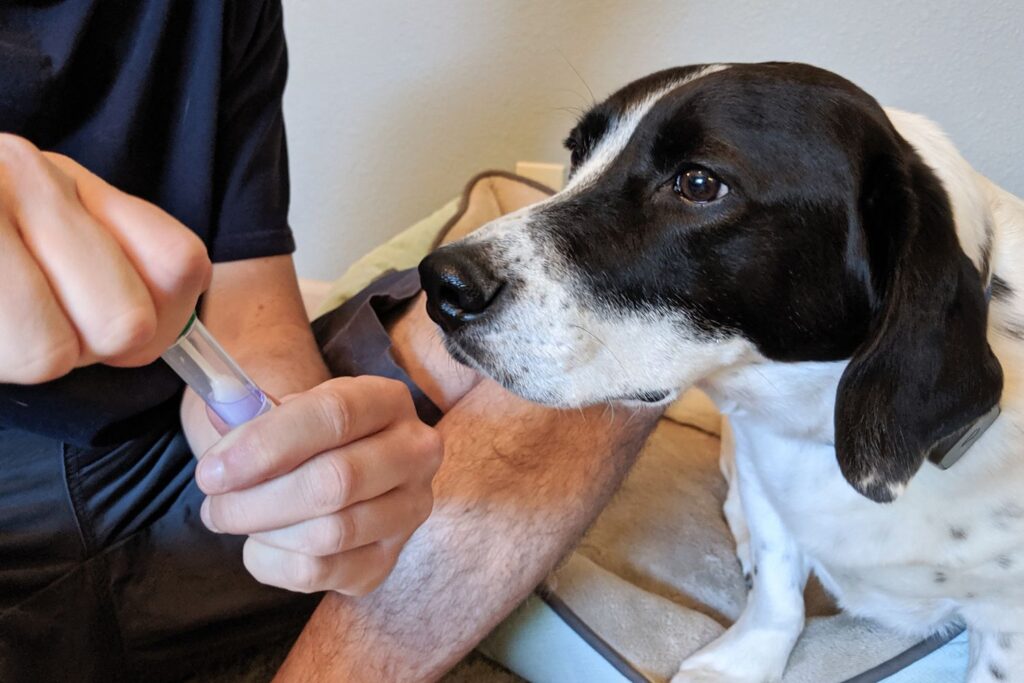A dog DNA test analyzes your dog’s unique genetic composition by comparing it to a large and proprietary database, which can differ from test to test. We purchased and tested 12 dog DNA kits, looking for clear instructions, reliable support, timely results, and user-friendly ways to analyze your dog’s data. We also noted when DNA tests had extra features, like the ability to network with other dog owners or provide nutritional advice.
“The big takeaway with genetic testing for pets is it’s more for informational and entertainment purposes,” says Jenna Stregowski, a registered veterinary technician and the Pet Health & Behavior Editor for the Daily Paws. Instead of making conclusions about your dog’s health based on DNA results, Stregowski suggests using them as a guide for questions and concerns at your next veterinary appointment.
Each manufacturer we tested has its own proprietary data it uses for comparing your dog’s DNA and deriving breed information, shared traits, and known genetic health markers. While the data can be fascinating, it is necessarily imperfect, since genetic factors don’t always match up neatly with human-created dog breed categories. Similarly, any health information from an at-home dog DNA test is derived from statistical correlations between specific recessive or dominant genes and is at best only advisory.
Wisdom Panel Essential Dog DNA Collection Kit is an approachable priced test providing insight into a dog’s genetic makeup along with information on traits and health issues commonly encountered by similar breeds. This test is designed to give you a clearer understanding of your dog but it does not provide a diagnosis and should not be used to determine treatment.
Per the instructions that came with the test, we registered on the website and watched a short video demonstrating how to collect the sample from our dog. When setting up an account you are given the option to opt out of having your dog’s results made public. The default is to opt-in but the choice is clearly presented. If you do share your results, you’ll be able to explore connections to other registered users with dogs who could be relatives of your dog.
We started the sample collection process two hours after our dog had eaten by checking their mouth to make sure it was clear of food that might cloud the results. Our participating dog didn’t care for the bristled tool, similar to a mascara wand, that was used to gently swab the inside of their mouth but it only lasted 15 seconds. The sample is mailed back to Wisdom Panel in the same box it arrived in. It is clearly labeled with ‘do not destroy’, but we recommend exercising caution when opening your package to keep the box intact.
Before the test results arrived, we only had an approximate age for our dog participant from the shelter where they were adopted, and a hunch on the mix of breeds we might find on their family tree. The results were delivered earlier than anticipated (within three weeks) and detected ten different breeds with a percentage of each breed.
Through the Wisdom Panel app and website, registered users can explore their results, learning about the history of each related breed along with traits and characteristics that your dog may have inherited, including the shape of their snout, the length of their legs, and potential health risks your dog may be predisposed to developing.
For example, if your dog’s genes are a high percentage match with the breed standard of a Chihuahua, then your dog could potentially experience a luxating patella. This does not mean that your dog will experience this condition in their lifetime.
Our dog’s DNA test showed 29 health concerns connected to their breed composition along with in-depth explanations of each and the associated breed. It’s important to remember that the health risks are informational and not cause for alarm. If you do find that your dog is experiencing symptoms, you should discuss it with your veterinarian.
Results delivered within three weeks
:strip_icc()/embark-dna-test-for-purebred-dogs-89c891fe39c04eaa9e2effefa26c9cbf.jpg)
Embark’s DNA Test for Purebred Dogs, Health & Ancestry Kit combines genetic testing with health-related data specific to purebred dogs. Whether you are certain of your dog’s lineage or not, this test will provide insight into the genetic makeup of your dog, which isn’t shared by any other dog, even their siblings. Like our pick for Best Health Screening, Embark’s Dog DNA Test, Breed & Health Kit, this test from Embark analyzes more than 230 genetic health risks and more than 35 physical traits.
For our participating purebred dog, we felt that the analysis of their physical traits was less than accurate, but this feature could be entertaining for someone with a purebred puppy. The genetic health risks were both eye-opening and reassuring, but ultimately will be used as points of discussion for preventative care with a veterinarian.
For the health of purebred dogs, information regarding their genetic diversity can be helpful. The results take into account your dog’s coefficient of inbreeding or COI, and where it falls in relation to both your dog’s breed and all other dog breeds. With purebred dogs, the practice of inbreeding can be used to maintain or emphasize characteristic traits of the breed, but it also leads to low genetic diversity which can lead to health complications.
Keep in mind that genetic data is different from the traditional evaluative methods used to assess a dog’s pedigree. While data obtained from a DNA test may be more scientifically accurate than pedigree measures that make determinations based on lineage, ultimately pedigree is determined by registering organizations, like the American Kennel Club.
Analyzes over 230 health markers
How We Picked
Testing: We researched and purchased 12 DNA tests for dogs. Each one was sent to a human eager to learn more about the genetic makeup of their furry companion in their home.
Each participant followed the instructions for their specific test. They recorded their initial impression of what the test involves and then collected the DNA sample from their dog, making note of the experience and any issues encountered.
When their results arrived, each tester made note of the turnaround time and how it compared to their expectations along with their overall impression of the process. As they dove into their dog’s results and corresponding analysis, our testers were asked to consider the efficacy of the information they received, whether they found it useful, and if they enjoyed any of the additional features provided.
What to Look For
Database and Accuracy
There’s no universal database for dog breeds that all DNA test results measure up to, and each dog DNA test creator has their own proprietary database and algorithms used to detect and analyze genes found in DNA. If you have the means to test your dog’s DNA with tests from different manufacturers, you will most likely receive results with slight variations.
Embark and Wisdom Panel both claim to have a database with over 350 breeds, types, and varieties along with over 35 physical traits. Currently, Wisdom Panel claims its breed results are over 98 percent accurate, and Embark claims its breed connection results are close to 99 percent accurate.
Sample Collection
At-home dog DNA tests provide clear directions and a tool shaped like a cotton swab or mascara wand with soft bristles that will be used to collect your dog’s DNA sample. This tool will require you to insert and rub it along the inside of your dog’s mouth for several seconds. The instructions and duration vary among brands, but generally, it is best to administer two to three hours after a dog’s most recent meal to clear out any remaining food particles.
Turnaround Time
All of the selections on our list deliver results in under four weeks, but there are other testing companies that require a longer duration to deliver results. Your reason for testing and your level of patience will factor into which type of test you should choose.
Breed Standards
The concept of a breed standard was designed for a myriad of reasons, but primarily in part for humans to categorize and organize canines. There’s no universal database for dog breeds that all DNA tests refer to. Breed standards for different organizations around the globe, such as the American Kennel Club, tend to favor certain traits and features that are connected to dominant and recessive genes.
Health Results
The health information provided by a dog DNA test is not a diagnosis. If you have concerns about your dog, you should discuss the results with your veterinarian to determine a course of action which could include preventative care.
More We Recommend
:strip_icc()/dogdna-e14d2a15e2e74e21aed5c0a864737371.jpeg)
Best For Inherited Traits: Ancestry, the company behind one of the most popular DNA tests for humans, now offers a DNA test kit for dogs. The test provides results that let humans explore potential traits and behaviors their dog may have inherited, breed composition, and possible matches with canine relatives.
Our human tester liked the straightforward directions for collecting the sample, and felt that it was easy to collect the needed saliva from the participating dog. The kit arrives with everything needed, including a box with the postage required to send your dog’s sample to the lab. The DNA is collected by swabbing the inside of your dog’s cheek, placing the sample in a vial, and shaking it all up. Results are available within two to four weeks after sending your sample — our tester received theirs after three weeks.
Our tester enjoyed learning about their dog’s breeds and associated traits, noting that they had an interesting “”Discover Your Pet’s Personality” section that made educated guesses at the participating dog’s personality. They felt that their dog’s personality lined up with the results. (It’s important to note, though, that genetics are only part of the equation of any dog’s personality!)
As with any DNA test, the matches are largely dependent on other users also signing up for this dog DNA test, so you will likely find different results and connections for the same dog across different tests. If you already have an Ancestry login, you can use the same credentials to activate the Dog DNA Test Kit and explore your results. Otherwise, you will need to create an account to get started.
Ancestry’s proprietary reference database consists of dog DNA collected from over 20,000 dogs from all over the world along with information about their breed and their region of origin. Your dog’s DNA is assessed and compared to over 400 dog breed classifications for traits and characteristics they may have inherited.
Results in two to four weeks
:strip_icc()/wisdom-panel-breed-discovery-dog-dna-collection-kit-9f3e2fc0340b44189b93340c88095348.jpg)
Best for Breed Identification: Wisdom Panel Breed Discovery Dog DNA Collection Kit provides an evaluation of a dog’s genetic mix, makes virtual connections with potential relatives, and screens for a genetic mutation associated with medication sensitives. It’s also the least expensive dog DNA test among our top selections.
Like our choice for Best Overall, this dog DNA test is made by Wisdom Panel and arrives in a box that will be used to mail your dog’s sample to the lab. The instructions are easy to follow and a bristled tool is required for a sample collection from a dog’s mouth. Our dog participating was uneasy throughout the 15 seconds required to swab the inside of their mouth, but the ordeal was over quickly.
Our results were delivered on time and easily accessible through the website and app. The analysis included 15 breeds along with an estimated percentage and detailed information about each breed, including physical traits, temperament, and training expectations. The breed composition and lineage of three prior generations were also provided. The genetic mutation known as MDR1 (multidrug resistance 1) was not found in our tester dog, which is helpful to know since it is associated with medication sensitivities, some of which can be potentially fatal if administered.
If you opt in to have your results made public during registration, potential relatives of your dog will be shown. There are also additional insights pulled from results behind a paywall.
Results in two to three weeks
:strip_icc()/embark-breed-health-kit-40fbcafe77b6431b8eb346c62cbe0704.jpg)
Best for Health Screening: Embark’s Dog DNA Test, Breed & Health Kit provides a DNA evaluation along with the results of screening for more than 230 potential health-related issues your dog could experience within their lifetime.
Developed in partnership with Cornell University College of Veterinary Medicine, the analysis Embark provides is designed to empower dog parents with tools to help them navigate potential health conditions and complications, such as drug sensitivities. The results are not a diagnosis but can serve as a conduit for informing conversations with your veterinarian, and when it comes to your dog’s well-being, you are their best advocate.
After setting up an account on the website or through the Embark app, the directions for sample collection are clear and easy to follow. The kit comes with everything needed including a soft, spongy swab that you will rub along the inside of your dog’s mouth for 30 seconds and a pre-addressed mailer to send your dog’s sample to Embark’s lab.
The breed composite includes an evaluation of over 35 physical traits, such as body size, tail length, propensity for shedding, and even an approximation of a dog’s ability to tolerate altitude, which is very useful if you plan to fly with your dog. If your dog hasn’t reached their full size, the results can also give you an estimate of their adult weight.
Our results, delivered on the early side of the two to four weeks window, connected us with potential relatives of our dog, which we found to be entertaining.
Screens for 230+ conditions and medical complications
FAQ
Yes and no. Based on the genetic information gathered, labeled, and classified, connections can be made between breeds and various traits associated with those breeds.
The science of DNA testing is still evolving. And it’s important to remember that any indicators for dog DNA tests have been developed and labeled by humans. For example, the standards that define a specific breed, like a Labrador, were defined by people to help people learn about and understand canines.
You can test a dog’s DNA at any age. We recommend waiting until puppies have weaned from their mother for a least a few weeks to avoid the risk of DNA contamination from the milk.
The results depend on the type of kit you ordered and the database of the manufacturer. Results may include information on your dog’s genetic makeup including breed composition, inherited traits and characteristics, connection to potential relatives and ancestors, along with genetic health conditions they may be susceptible to developing.


